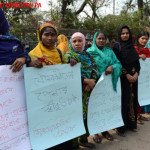 • Female sex workers in Bangladesh
• Female sex workers in Bangladesh
In a feature published on thebmj.com today, Jocalyn Clark provides a moving account of the plight of female sex workers in Bangladesh. With effectively no voice to demand basic rights and entitlements, these women suffer severe social stigma, poor health, and violence. Several non-governmental organisations have stepped in to offer health services, advocate on their behalf, and empower them to pursue alternative options for a living. Progress remains slow however, given the lack of political will to recognise this group and directly tackle factors such as poverty and social estrangement, which drive women and children into the sex trade.
• Offering welfare advice to patients
In news, Jacqui Wise writes about recommendations from the Low Commission report on providing social welfare advice to patients seen in primary care. Advice to individuals and families on problems in their everyday lives, their entitlements, and issues such as managing their debts could go a long way in improving their health and wellbeing. Not doing so, says Michael Marmot, amounts to “fighting the clinical fight with one hand tied behind our back.’’
 • Incentives in healthcare
• Incentives in healthcare
Also in news, Cheryl Travasso shares findings from a study in Bihar, India, which demonstrates the impact of financial incentives in improving the delivery of essential health services by community health workers.
Offering a divergent view in her column published on thebmj.com, Margaret McCartney questions the ethics of financial incentives to drive behaviour change in patients and its impact on the doctor-patient relationship. While studies show the early impact of such incentives in promoting positive lifestyle changes, evidence on the long term effects is lacking. Furthermore, it is worth speculating if income disparities might drive people to opt into such incentive programmes, and might be a reflection of prevalent inequalities in society.
Anita Jain is assistant editor, The BMJ.
